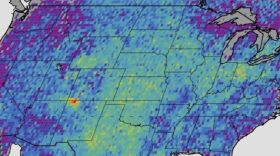Scientists have a new worry about a special group of organisms that protects soil on the Colorado Plateau. They’re called “biocrusts,” and they’re easily destroyed when trampled—but new research shows there’s another menace: climate change.
Biocrust is created by mosses and lichens glued together with photosynthetic bacteria. It forms a kind of bumpy shield on the soil surface.
Scott Ferrenberg is a research ecologist with the Flagstaff-based Southwest Biological Science Center of the U.S Geological Survey. He collected a decade’s worth of data in Utah on how biocrusts respond to warming temperatures and changes in rainfall.
“My personal expectation was that physical disturbance would be much more dramatic – much more negative – than the climate change effects,” Ferrenberg said. “Sadly and shockingly, we found that they were very much equivalent.”
Mosses and lichens started to disappear in his experiment – just as they do when people or cars repeatedly trample the soil. That’s bad news, says Sasha Reed, a coauthor on the research.
“Moss and lichen communities are rock-solid stable,” Reed says. “The wind can howl and they will not lose sediment into the air as dust.” That’s why healthy biocrust is so important. Reed says much more erosion with occur without it.
The researchers hope biocrust will figure out how to adapt to the new climate. They say managers could try to speed up the process by transplanting biocrust to the Colorado Plateau from hotter places.
See the research paper here.








